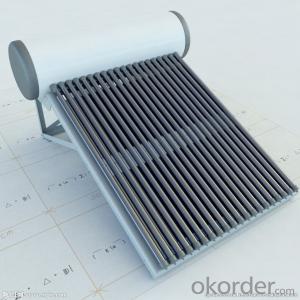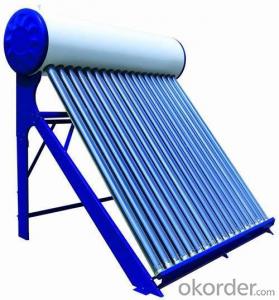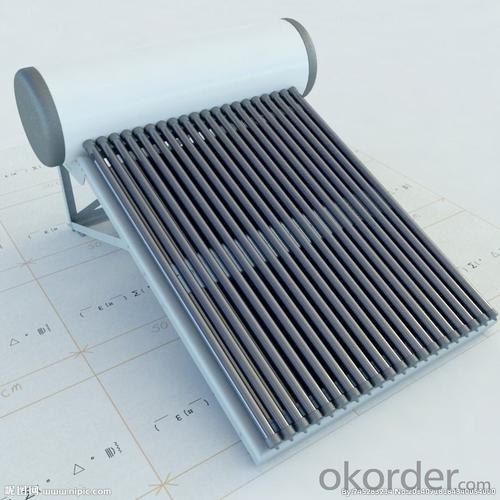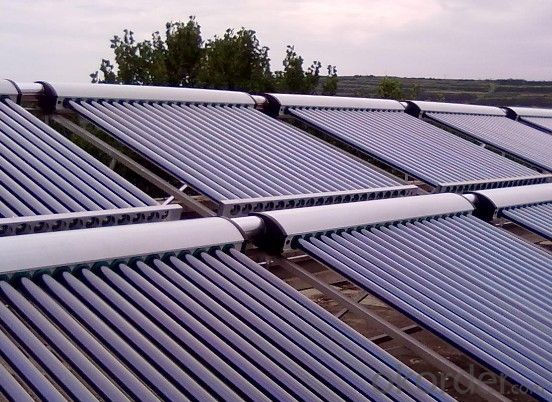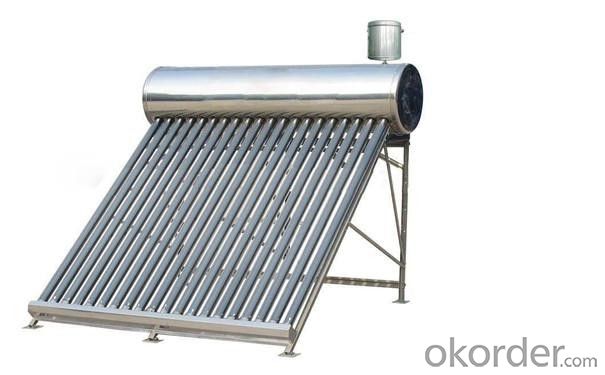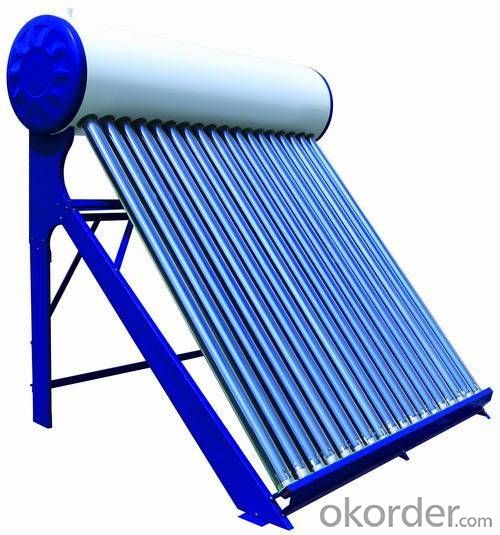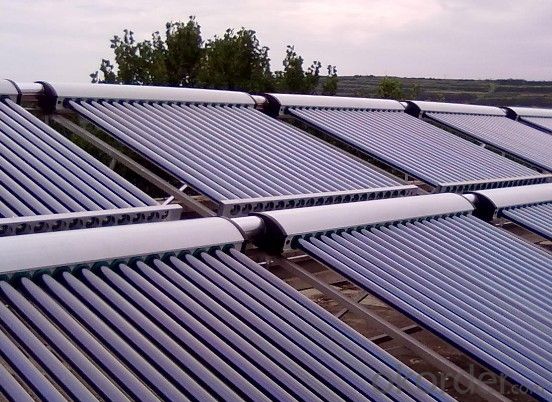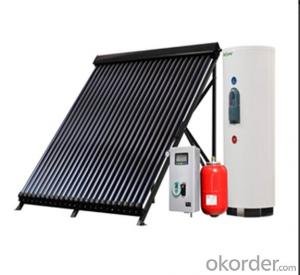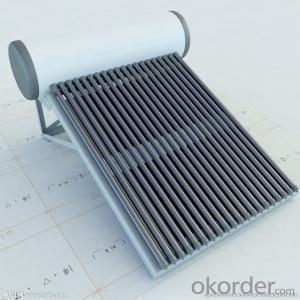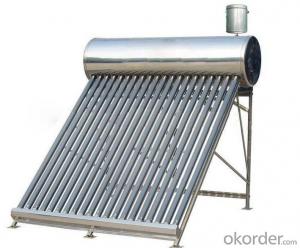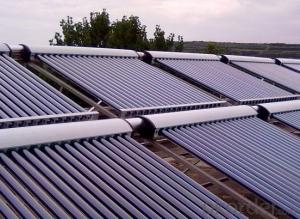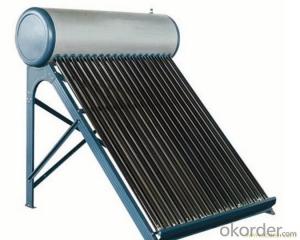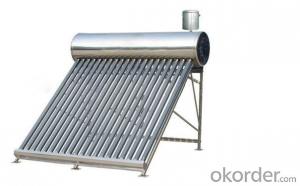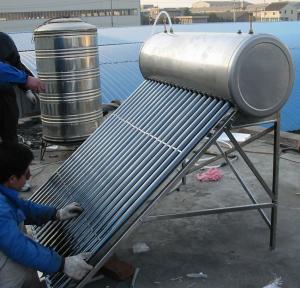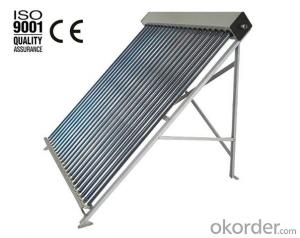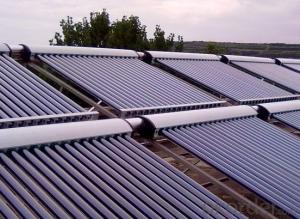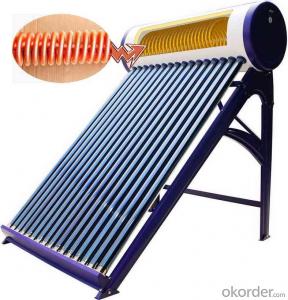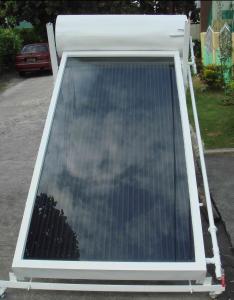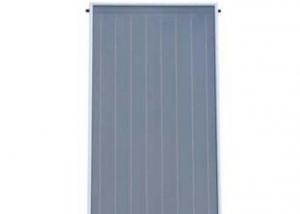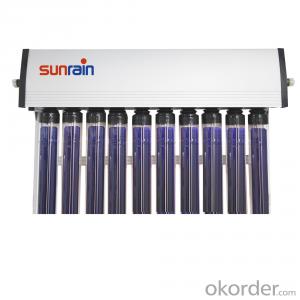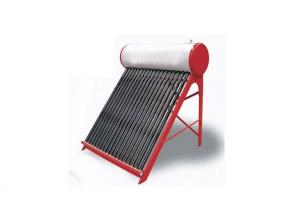Solar Water Heater Tube - Vacuum Tube Solar Collector China Top Supplier
- Loading Port:
- China main port
- Payment Terms:
- TT OR LC
- Min Order Qty:
- 10 set
- Supply Capability:
- 10000 set/month
OKorder Service Pledge
OKorder Financial Service
You Might Also Like
Introduction of Non-Pressure Solar Water Heater:
Non-pressure Solar Heater is one of the most economical solar water heating device with pretty high efficiency at the same time. It consists of hot water storage tank, solar vacuum tubes with mouth plug in storage tank, and bracket supporting tank and tubes.When cold water in evacuated tubes is heated with solar irradiation, as the specific gravities of hot water and cold water are different, hotter water goes upward to storage tank and colder water goes downward to glass tubes. through this continuous circulation, the cold water in storage tank will be gradually heated till sunset.
Solar water heaters working principle
1. The solar collector absorbs solar energy and transmits it to the solar water heater tank through circulation
2. When the temperature of the collector reaches the set value, the controller starts the circulation pump automatically
3. The circulation pump makes heat-conducting liquid circulate automatically
4. The heat-conducting liquid transfers heat to water by lower heat exchanger in the water tank.
5. When the temperature difference between solar collector and heat pipe solar water heaters tank doesn't reach the set value, the circulation pump will be shut automatically
6. In case the temperature of the water tank does not reach Tmax, Electric Heating Element will start to work automatically
Solar water heaters working station component:
1. Operating screen
2. Manometer
3. Pump speed adjust switches
4. Temperature difference circulation pump
5. Flow rate indicator
6. Return circuit connector
7. Safety valve
8. Expansion vessel connector9. Return circuit connector
10. Wall mounting
11. Expansion vessel:8L
12. Pressure resistance: 10 bar pressure for expansion vessel
Solar water heaters specification:
Description | solar water heaters |
Material of out manifold | 0.55mm thickness color steel/ fluorine carbon steel |
Material of inner tank | Food grade 2.0 mm thickness SUS304 stainless steel |
Tank insulating layer | 40mm 45kg/m³ high-density polyurethane foamed |
Inlet and outlet hole | Male G1'' |
Max pressure | 0.6 Mpa |
Solar collector tube | 3.3 Borosilicate glass with N/Al coating |
Thickness of glass tube | 1.6mm |
Vacuum tube tightness | P≤0.005 Pa |
Absorption | as=0.93-0.96 (AM1.5) |
Emission ratio | εh=0.04-0.06 (80C±5C) |
Idle sunning property parameters | Y=220~260m2.C/KW |
Average heat loss coefficient | ULT=0.6~0.7W/(m2.C) |
Bracket: | 2.0mm thickness aluminum alloy |
Tank weight | 75KGS |
Tank size | 560mm Dia x 1810mm Height |
Tank capacity | 300L |
Solar collector | 2pcs 58x1800x15tube solar collector |
Absorber area | 2.811 m² |
Working station | SP116 working station |
Heat exchanger length | Upper:12m, Underside:18m |
Solar water heaters details show:
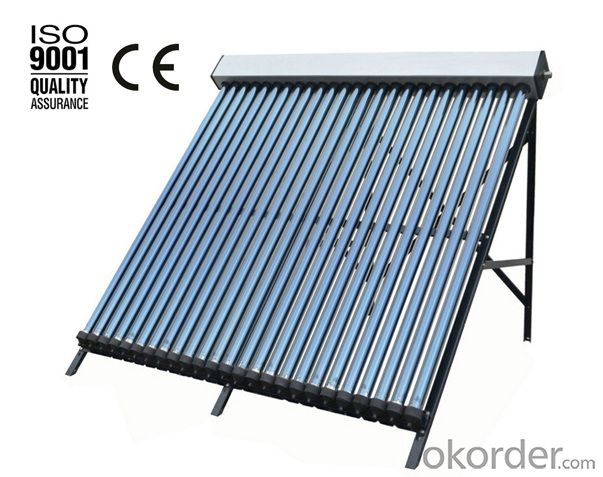
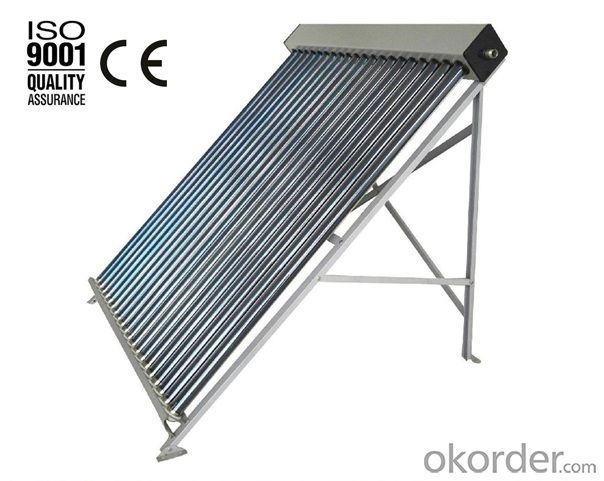
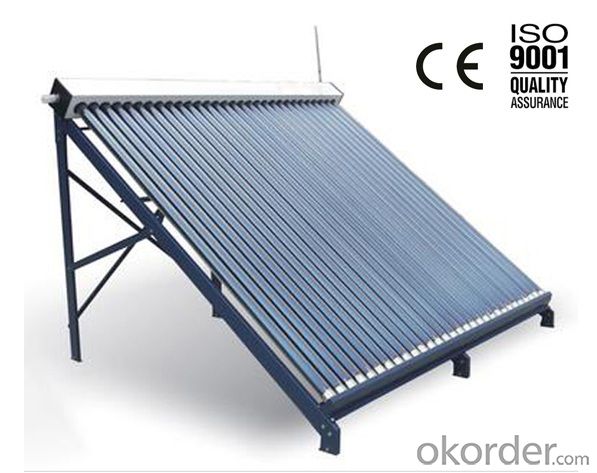
Benefits of this kind of solar water heaters:
1. Prolong the life of your existing water heater
2.Costs less than an electric, gas or oil water heater
3.No maintenance required
4.Lasts longer than a traditional hot water heater
5.Reduce your water heating costs
- Q: Can a solar water heater be used in areas with high levels of saltwater or corrosive environments?
- Solar water heaters can indeed be used in areas with high levels of saltwater or corrosive environments. However, it is imperative to choose a solar water heater that is specifically designed for such conditions. This is because standard solar water heaters may be prone to corrosion caused by the saltwater or other corrosive elements found in these environments. To ensure the durability and effectiveness of a solar water heater in areas with high saltwater or corrosive environments, it is advisable to opt for models that incorporate corrosion-resistant materials like stainless steel or specially coated tanks and collectors. These materials possess greater resistance against the corrosive effects of saltwater and other corrosive elements, thereby guaranteeing the longevity and efficiency of the solar water heater. Furthermore, regular maintenance and cleaning are essential in these environments to eliminate any salt deposits or corrosive substances that might accumulate on the solar water heater. By doing so, the lifespan of the system can be extended, and its performance can be optimized. By specifically selecting a solar water heater designed for high saltwater or corrosive environments and implementing proper maintenance practices, it is feasible to successfully harness the advantages of solar water heaters in these areas.
- Q: Does a solar water heater require batteries?
- Batteries are not necessary for a solar water heater. Unlike solar panels that convert sunlight into electricity and store it in batteries, solar water heaters utilize the sun's energy directly to heat water. Generally, they are composed of a solar collector that absorbs sunlight and transfers heat to either a water storage tank or pipes. Consequently, the water is heated and stored for later use. Thus, solar water heaters operate without the need for batteries, making them a cost-effective and energy-efficient solution for water heating.
- Q: How does the durability of a solar water heater compare to a traditional water heating system?
- The durability of a solar water heater is generally comparable to that of a traditional water heating system. However, since solar water heaters have fewer moving parts and rely on sunlight as their primary energy source, they may have a longer lifespan and require less maintenance compared to traditional systems. Additionally, solar water heaters are not prone to issues such as rust or corrosion that can affect traditional systems, which can contribute to their overall durability.
- Q: Can a solar water heater be used in areas with limited hydrogen fuel cell resources?
- Yes, a solar water heater can be used in areas with limited hydrogen fuel cell resources. Solar water heaters utilize the energy from the sun to heat water, eliminating the need for hydrogen fuel cells. Therefore, they offer a viable and sustainable alternative for heating water in regions where hydrogen fuel cell resources are scarce or unavailable.
- Q: Can a solar water heater be used in areas with limited access to solar insolation data?
- Yes, a solar water heater can still be used in areas with limited access to solar insolation data. While it may be challenging to accurately estimate the potential solar energy available, solar water heaters can still operate effectively in areas with varying levels of sunlight. It is recommended to use conservative estimates and design the system to be more efficient to compensate for the uncertainty in solar insolation data. Additionally, periodic monitoring and adjustments can be made based on the actual performance of the solar water heater in order to optimize its efficiency.
- Q: What are the benefits of using a solar water heater?
- There are several benefits of using a solar water heater. Firstly, it helps in reducing energy costs as the sun's energy is free and abundant. This can lead to significant savings on electricity or gas bills. Secondly, solar water heaters are environmentally friendly as they do not emit greenhouse gases or contribute to pollution. They utilize renewable energy, thereby reducing reliance on fossil fuels. Additionally, solar water heaters require minimal maintenance and have a long lifespan, making them a cost-effective and durable solution. Moreover, using solar energy for heating water can help in reducing the demand on the electrical grid, leading to a more reliable and stable energy supply.
- Q: What is the required maintenance cost for a solar water heater?
- The required maintenance cost for a solar water heater can vary depending on factors such as the type and size of the system, as well as the manufacturer's recommendations. Generally, the maintenance cost for a solar water heater is relatively low compared to other types of water heaters. It typically includes periodic inspections, cleaning of solar panels, checking and replacing any worn-out parts or components, and ensuring proper functioning of the system. However, specific maintenance costs can only be determined after considering the specific model and any additional warranty or service packages offered by the manufacturer.
- Q: How does the material of the solar collector affect the performance of a solar water heater?
- The material of the solar collector plays a crucial role in determining the performance of a solar water heater. The material should have high thermal conductivity to efficiently absorb and transfer heat from the sun to the water. Additionally, it should have low heat loss characteristics to minimize energy wastage. Common materials used for solar collectors include copper, aluminum, and glass, each with their own benefits and drawbacks. Ultimately, the choice of material impacts the efficiency and overall effectiveness of the solar water heater.
- Q: How long does it take for a solar water heater to heat water?
- The time it takes for a solar water heater to heat water can vary depending on factors such as the size and efficiency of the system, the amount of sunlight available, and the starting temperature of the water. However, on average, a solar water heater can heat water to desired temperatures within a few hours under optimal conditions.
- Q: How does the water quality of a solar water heater compare to a traditional water heating system?
- The water quality of a solar water heater is generally comparable to that of a traditional water heating system. Both systems rely on water from the same source, such as a municipal supply or a well. However, solar water heaters have an advantage in terms of reducing mineral and sediment buildup, as they often use a separate storage tank with a heat exchanger. This can help improve the overall water quality by minimizing the accumulation of impurities.
Send your message to us
Solar Water Heater Tube - Vacuum Tube Solar Collector China Top Supplier
- Loading Port:
- China main port
- Payment Terms:
- TT OR LC
- Min Order Qty:
- 10 set
- Supply Capability:
- 10000 set/month
OKorder Service Pledge
OKorder Financial Service
Similar products
Hot products
Hot Searches
Related keywords
